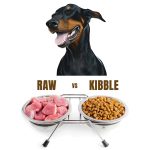Navigating food allergies and sensitivities in Dobermans is a detailed process that hinges on a blend of vigilance, dietary management, and close communication with veterinary professionals. By understanding the nuances between food allergies and sensitivities, identifying common allergens, and adopting a tailored nutritional strategy, you can significantly alleviate your pet's discomfort and enhance their quality of life. Here's an extended look at how to manage food allergies and sensitivities in Dobermans through a tailored nutritional approach, including how to incorporate supplements effectively and the importance of product selection to maintain a healthy diet.
Extended Strategies for Managing Food Allergies and Sensitivities in Dobermans
Transitioning and Experimentation with Diets
When embarking on an elimination diet or switching to hypoallergenic formulas, gradual transition is key. This means slowly introducing the new food by mixing it with the current food and gradually increasing the ratio over a week. This approach helps minimize gastrointestinal upset.
Understanding Hypoallergenic Diets
While hypoallergenic diets are pivotal, it's essential to understand that not all such diets are created equal. Some Dobermans might react differently even to the proteins considered hypoallergenic. It's all about finding what works for your specific dog. Check out this hypoallergenic dog food.
The Role of Supplements
Beyond omega-3 fatty acids, other supplements might assist in managing food allergies and sensitivities:
- Probiotics: Can aid in maintaining a healthy gut flora, potentially reducing the incidence of gastrointestinal symptoms associated with food sensitivities. My favorite probiotic.
- Vitamin E: As an antioxidant, it can support skin health, providing relief from allergic dermatitis symptoms. Amazing Vitamin E on Amazon.
Always introduce any supplement under the guidance of your vet to avoid interactions with the allergy management diet.
Recommended Products for a Hypoallergenic Diet
When selecting products for your Doberman's diet, consider these aspects:
- Limited Ingredient Diets (LIDs): Look for commercial dog foods that are explicitly labeled as limited ingredient diets. These products typically feature a single protein source and limited carbohydrate sources, making it easier to pinpoint and avoid potential allergens. One of my favorite diets.
- Novel Protein Sources: Foods containing proteins that your Doberman has never been exposed to can be a good choice. Examples include kangaroo, Quail, and Rabbits. Products like "Nutrisource Elemental" line offer such novel protein options.
- Prescription Diets: Brands like Royal Canin, Hill's Science Diet, and Purina Pro Plan offer prescription hypoallergenic diets formulated to reduce allergen exposure. Consultation with your vet is required to purchase these diets, ensuring a professional oversight on the dietary choices.
Monitoring and Adapting
Regular Vet Visits
Establish a schedule for regular follow-ups with your vet. These appointments allow for adjustments to the dietary plan based on your Doberman's response and ensure that their nutritional needs are continually met.
Food Diary
Maintain a comprehensive food diary that tracks not only what your Doberman eats but also their reactions to different foods. This diary can be invaluable in pinpointing specific allergies or sensitivities.
Family and Sitter Education
Ensure that everyone involved in your Doberman's care understands their dietary restrictions. This includes family members, pet sitters, and dog walkers. Consistency in diet, especially with food-sensitive pets, is crucial.
Navigating food allergies and sensitivities in Dobermans with a nutritional approach is a dynamic, ongoing process that requires patience, observation, and often a bit of trial and error. By staying informed, working closely with your vet, and being methodical about dietary choices and monitoring, you can create a suitable nutritional plan that supports your Doberman's health and vitality, allowing them to thrive despite their dietary restrictions.


